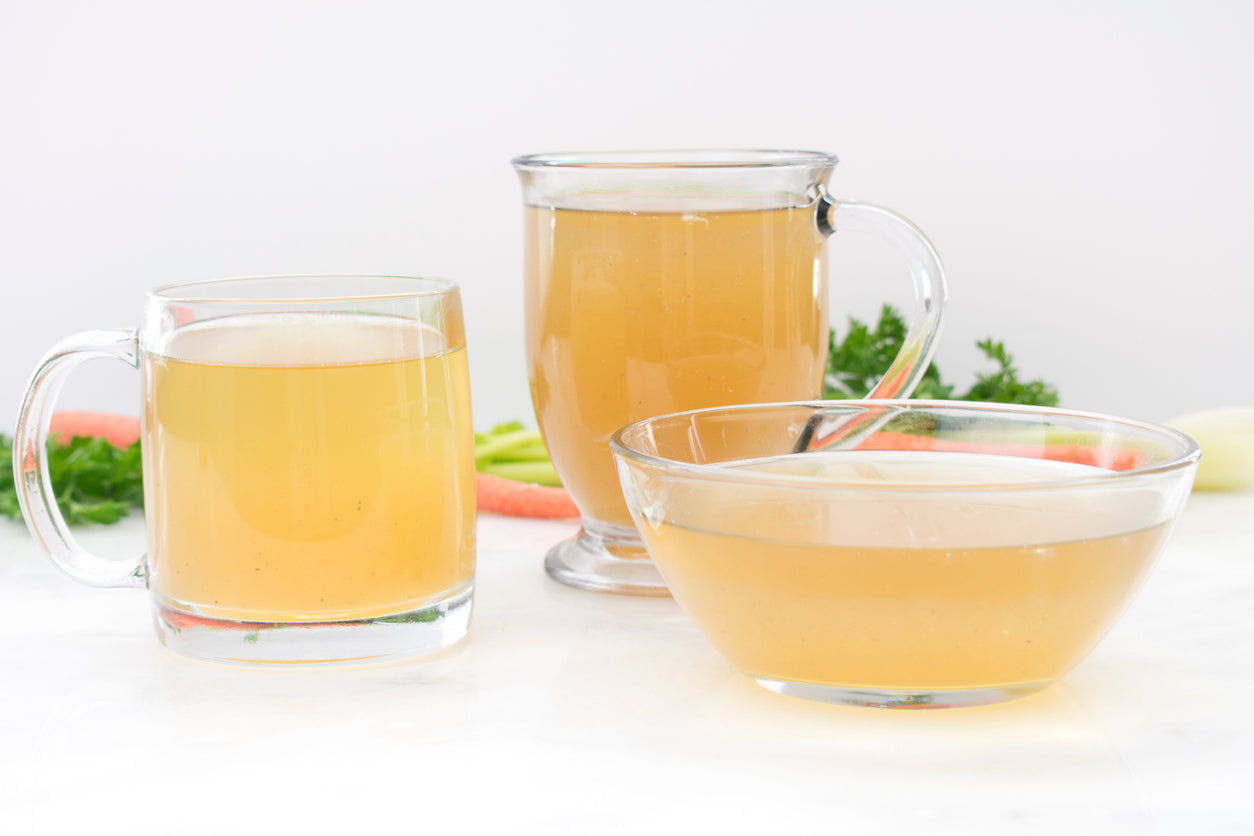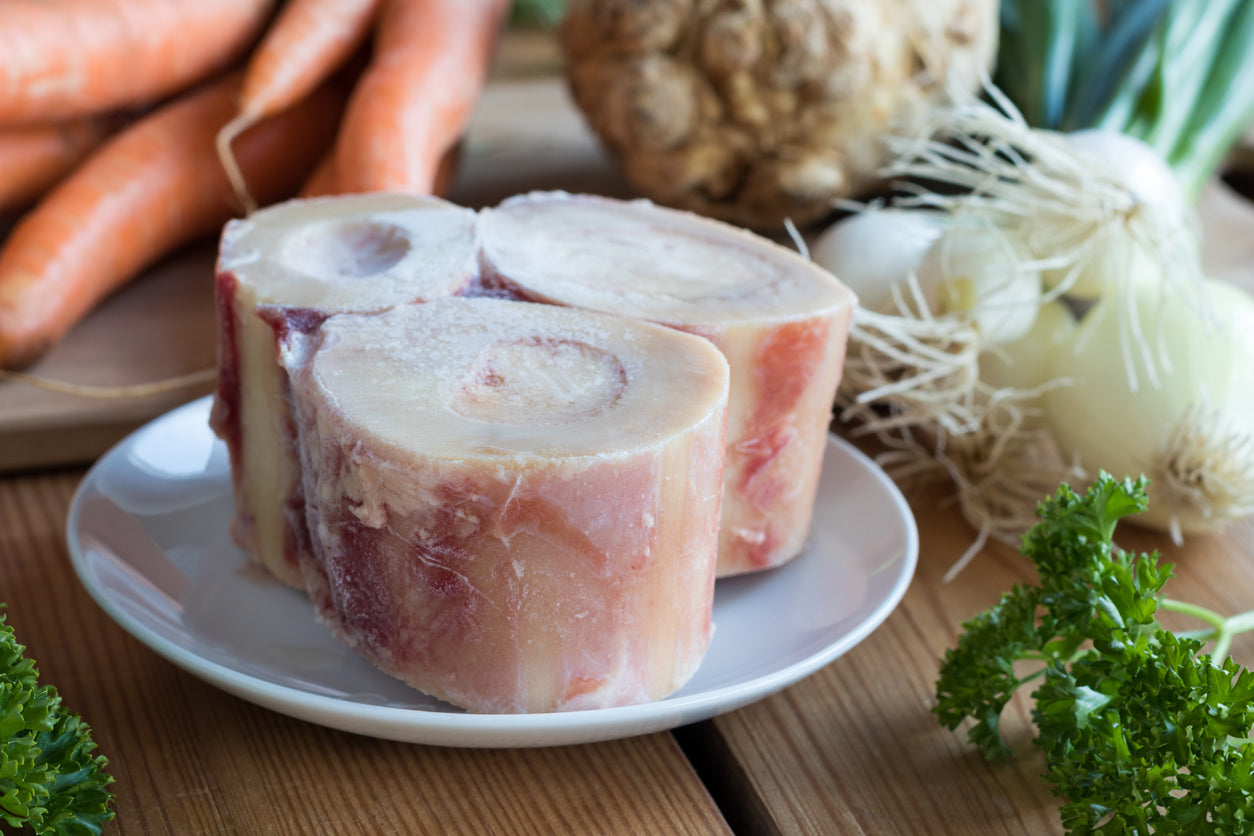
An Overview of Bone Broth
- What bone broth is
- The beneficial nutrients in bone broth and why you need them
- What quality bone broth is made of
- Bone broth vs. stock vs. broth
- The importance of gelatin
- Options and alternatives for every lifestyle
- How bone broth helps with inflammation, skin, gut health, and more
What is Bone Broth?
Bone broth is a nutrient-rich liquid that makes a healthy and fabulously beneficial addition to your daily routine. As a soup, in a smoothie, or as part of many mouth-watering desserts, it provides results you can see in a matter of days. This tasty and hunger-curbing broth restores, replenishes, and rejuvenates while helping you shed stubborn belly fat, reboot your health, and replenish collagen through gelatin. Now, what could beat that?I often refer to bone broth as "liquid gold" because it's full of nutrients that have the power to reduce inflammation, healing your entire body from the inside out. Bone broth offers astonishing results from incredible anti-aging benefits from gelatin to improving digestive issues that may ultimately lead to additional health concerns. The slow cooking of marrow bones allows proper extraction of the essential minerals and gelatin. This slow cooking process breaks down the animal bones, allowing all the nutrients and minerals to release. The hours of cooking are what turn the collagen to gelatin, making it and glucosamine more easily digestible. So, be patient and trust me when I say the rewards you will gain are worth the wait!
Nutrients in Bone Broth
I don’t want you to think of bone broth as another fad diet, because it’s not my friends. It’s a healthy lifestyle change that brings unbelievable rewards with every serving. Bone broth contains an incredible amount of easily absorbable amino acids that are vital to your health. In particular, the amino acids glycine and proline aid your liver in removing those damaging toxins from your body. And let’s be honest, we’re exposed to toxins every day, even if we aren’t shoveling them into our mouths. Just think of the smoke, pollution, and overexposure to the sun, exposing you to harmful free radicals. There’s just no escaping contact with toxins, so making changes to your lifestyle is vital. While your body does have the ability to help reduce toxins, cleanse, and protect itself, bone broth is an excellent way to increase these benefits. Giving your natural cleansing systems a helping hand by incorporating bone broth into your daily routine helps it work more efficiently.
And if you haven’t heard, glycine is a building block of glutathione - one of the body's most potent detoxifying agents. These nutrients will heal your gut, blast away your wrinkles, and soothe your sore joints and muscles. Bone broth also offers additional nutrients, including:
- Calcium
- Magnesium
- Phosphorus
- Clean protein
- Healthy fats
- Vitamins
- Minerals
- Collagen
Why Bone Broth Nutrients Are Important
For decades, bone broth has been successfully healing the body, replenishing nutrients, and shedding pounds. Simply put, it’s an easy way to include all the essentials your body is missing and craving. Familiar faces such as Mark Wahlberg, Salma Hayek, and Gwyneth Paltrow rave about the results they've seen in a short period by implementing a bone broth lifestyle. Salma Hayek attributes bone broth benefits like gelatin to her looking and feeling young. And who wouldn’t love to have her youthful, glowing skin? And, many others rave about the additional bone broth benefits, including:
- Reducing muscle and joint pain
- Improving sleeping issues
- Healing leaky gut syndrome
- Improving skin tone, elasticity, and reducing wrinkles
- Restoring robust and luxurious hair
- Reducing the appearance of cellulite
- Strengthening the immune system
- Improving mood
- Boosting energy and metabolism
Why You Need Gelatin
Yes, you need gelatin in your diet. By far, the easiest, tastiest, and most effective method of flooding your cells with collagen and gelatin is through consuming bone broth. Collagen is a fibrous protein made of amino acids found in animal flesh and connective tissue, so boiling skin, tendons, ligaments, and bones allows you to cook the collagen right out and make gelatin. By adding gelatin to your daily diet, you replenish your body with the collagen it needs to:
- Fight wrinkles and additional signs of aging
- Strengthen bones, ligaments, and muscles
- Restore luster to your hair
- Strengthen your nails
- Bolster your immune system
- Heal your gut
- Reduce gas and bloating issues
- Soothe nausea and diarrhea
- Reduce inflammation throughout your body
Gelatin vs. Collagen
So, what makes gelatin and collagen different? Both gelatin and hydrolyzed collagen are made of animal collagen. While they share the same amino acid profile, their properties and structure do have some differences. Hydrolyzed collagen can dissolve in cold and hot water, yet gelatin cannot. Gelatin will “gel," but hydrolyzed collagen will not. Hydrolyzed collagen is sometimes more easily digestible because it can break down into smaller protein units.
Undeniable Collagen Benefits for Healthy Skin
Let’s talk about your skin concerns. You’ve been hearing the buzz about the anti-aging wonders of bone broth and want to know if it’s true. Am I right? Since collagen is responsible for the elasticity of your skin and gives it that vibrant, age-defying glow, you can look forward to jaw-dropping admiration when others see the premature signs of aging fade away. Yep, it’s that undeniable!
Collagen works to reduce the appearance of those fine lines and wrinkles we all dread while restoring dry, saggy skin. It’s what gives your skin its firmness while keeping it from looking prematurely old, dull, and gray. As you age, your body will naturally slow down its collagen production, so adding bone broth to your diet provides a tremendous benefit. And not to scare you, but your collagen production begins to minimize in your early twenties. Yep….twenties! Now, do you see why replenishing these nutrients with bone broth is so beneficial? I’m telling you, you’ll notice your radiant color come back, while the return of elasticity reduces those pesky fine lines and wrinkles in no time.
Bone broth also acts as a healing agent to help soothe and repair many other skin conditions, including eczema and acne. The nutrients in bone broth heal your skin by targeting and treating inflammation, irritation, and infection. Bone broth can even strengthen and firm your skin to minimize or erase the appearance of cellulite. Oh yes, you read that right the first time. You’ll notice smoother, healthier skin instead of the thin, collapsing effects that a lack of collagen will produce. How’s that for a reason to start drinking bone broth today?
What is Bone Broth Made From?
The healthiest ingredients make the most robust bone broth, so choose wisely—the most beneficial bones to use come from pastured, organic, and grass-fed animals. I highly recommend these choices because they are the most nutrient-dense bones you can use. Coming from an environment with substantially fewer toxins, you know you’ll be getting bones from healthy animals. Try to choose bones with the most cartilage since they yield the most collagen that will break down into your gelatin bone broth.
Where Should I Get My Bones?
Finding bones can be as simple as saving leftovers from your typical meals. If you’re not planning to make bone broth immediately, you can always store your bones in the freezer without worry. Some of your local butchers will have the bones you are looking for or should at least be able to order them for you. But if you have the option, I highly recommend visiting your local farmers market. Local farmers are an excellent source of high-quality bones. You can also find a few great options online. Your local health food store or your nearest Whole Foods should be able to provide you with soup bones as well.
Vegetarian Bone Broth Options
Are you a vegetarian, pescatarian, or vegan? No problem! You’ll find everything you need for a meatless alternative here. You may need to ease into your new bone broth routine if you tend to have issues with the amino acid glutamine. Glutamine can give some people a bit of trouble at first. Your body needs glutamine to:
- Keep your immune system healthy
- Help you recover quickly from illnesses and wounds
- Build your muscles and speed muscle recovery
- Improve digestion and brain function
Glutamine Sensitivity Alternatives
Now, if you’re one of those who are unable to metabolize glutamine well, never fear. This issue can stem from a variety of causes, including:- Unhealthy gut
- Lead toxicity
- Deficiency of vitamin B6
- Over-exposure to monosodium glutamate (MSG)
People who experience issues with glutamine may find that having too much upsets their stomach, causes headaches or creates a sluggish body or cloudy mind.
Not sure if you have a glutamine sensitivity? Even if you do not currently drink bone broth, your diet (if it’s a healthy one) is already high in glutamine. Meat, chicken, and fish are rich in it, as well as veggies like spinach and cabbage. If you feel the need to ease into your new bone broth routine, there are suitable alternatives I recommend to start you on the right track. One includes trying a meat broth. This is broth you can easily make by simmering bone-in cuts of beef, lamb, or poultry. You’ll want to leave the bones in to reap the full benefits. You’ll only simmer the meat broth for a few hours— roughly two hours for poultry, or four hours for beef or lamb—it has a much lower glutamine content than long-simmering bone broth. Once you detoxify your cells and give your body the nutrients it needs, you’ll build up a more substantial gut wall and be able to benefit from glutamine.
After a few weeks of drinking meat broth, start adding bone broth back into your diet gradually. At first, try minimal amounts—maybe a quarter of a cup—and continue to increase the amount every few days or so.
Bone Broth vs. Regular Broth vs. Stock
Many people ask me if they can substitute stock or a regular can of broth. If you're not entirely familiar with the terms broth, stock, and bone broth, they may sound interchangeable. However, they do have notable differences. While broth and stock have few, minute differences, many people do choose to use them in place of each other. So let's break down the differentiation of bone broth, stock, and broth:
- Broth is water simmering with meat, vegetables, aromatics, and sometimes bones. It typically cooks for only a few hours. It tends to be a thinner consistency, but more flavorful than stock.
- Stock comes from simmering water with bones and may sometimes have vegetables and aromatics. The stock should cook for roughly four to six hours. Using bones in stock helps create a thicker consistency.
- Bone broth comes from marrow bones, with or without meat. It’s most beneficial when cooking for eight hours for chicken and beef 24 hours or longer. It’s a much longer process than regular broth or stock but provides the most benefits.
Why is it so important to cook bone broth so much longer than stock? Cooking bone broth this way pulls all the nutrition right out of the bones. Regular broth has only a fraction of the nutrients, with little or no gelatin. Stock contains more gelatin, but not near as much as bone broth— it doesn’t cook long enough to extract as many of the essential bone-deep nutrients. Unlike stock or broth, bone broth has more gut-healing gelatin, anti-inflammatory nutrients, and building blocks of skin-smoothing collagen. It even has more flavor from simmering longer and is more filling and satisfying. If you genuinely want to see astonishing results, skip the can of broth and stock and go straight for the good stuff.
Bone Broth and Intermittent Fasting
Bone broth makes a safe, healthy, and practical addition to intermittent fasting. Intermittent fasting allows your body time to adjust to new dieting routines by helping your system transition to reducing calories and carbs. If you're looking to lower your risk of diabetes or poor heart health, turning to bone broth and intermittent fasting may be beneficial.
The Bottom Line of Bone Broth
I’m all about creating new recipes to add variation with my bone broth. Never an unhappy taste bud with my resource library of recipes! You can tailor your intermittent fasts to your personal and health goals and needs. A successful fast lets you enjoy the foods you’re eating, so be creative with your bone broth concoctions and toss in and mix up those nutritious veggies. Nourishing your body with a warm cup of bone broth throughout your day will help curb those cravings, boost energy levels, and help you meet your goals in no time.
So, who’s ready to take charge and improve your overall health in a delicious and satisfying way? From repairing to replenishing, bone broth will restore you inside and out, from head to toe. Find out how you can jumpstart your new lifestyle with bone broth today.
With Peace and Love,








